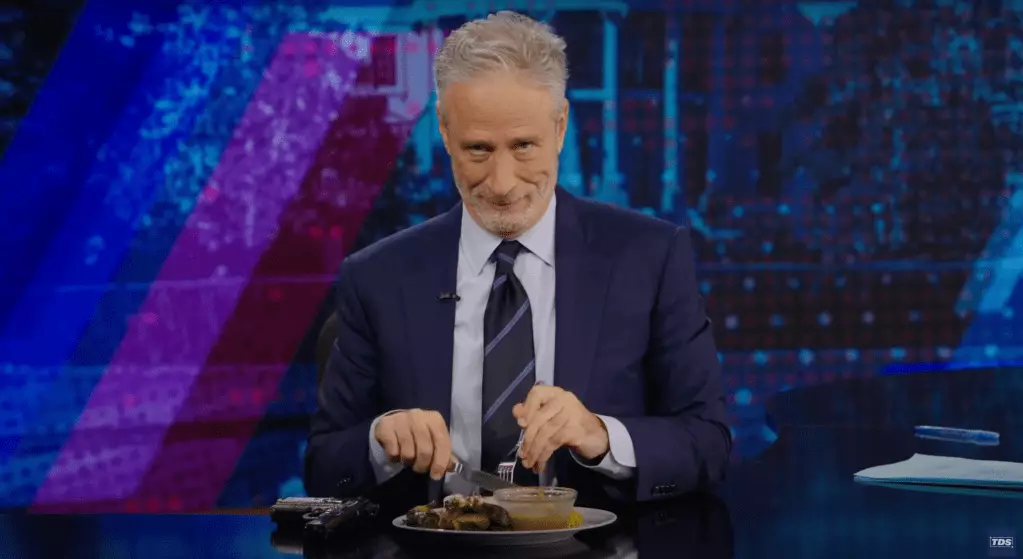In an entertaining yet thought-provoking episode of The Daily Show, Jon Stewart brought a unique blend of humor and critique to the forefront, leveraging the Thanksgiving dinner setting to make an astute political point. By stepping into the role of Hunter Biden, Stewart creatively illustrated the ongoing political entanglements through the lens of familial dynamics. His portrayal hinted at a more profound commentary on desperation and the need for forgiveness, not just within family settings but in the broader political arena, particularly regarding clemency and pardons.
Stewart’s comedic talents shone as he used this Thanksgiving scenario to reflect on Hunter Biden’s relationship with his father, President Joe Biden, suggesting that familial ties often intertwine with political maneuvering. The choice of setting was not accidental; it mirrored the complicated interactions that can arise when personal and political motives clash, making it an effective submission to a thought-provoking narrative on the nature of power and redemption.
As the segment progressed, Stewart shifted gears, honing in on a striking appointment by former President Donald Trump—the selection of Kash Patel as FBI director. This choice encapsulated the absurdities and entrenched loyalty within the Trump administration, a highlight that drew jeers from the audience. Stewart’s ability to reference such current events while maintaining an approachable comedic presentation injected a layer of seriousness into his monologue.
His commentary on Patel’s children’s book series, a seemingly self-important narrative framed against a landscape of conspiracy theories, led Stewart to parody the style of Dr. Seuss. Both absorbing and hilariously absurd, he crafted a clever retake on these fantastical narratives, emphasizing how real political conversations often devolve into nonsensical displays of loyalty and deflection. This juxtaposition of an innocent, whimsical style against the grim realities of contemporary politics underscored his criticism.
Stewart’s reflection on democracy culminated in a fiery proclamation about faith and the rule of law as the only separators from a disordered world. In his vivid imagery likening political figures to characters from the film “Madagascar,” he reinforced the notion that the integrity of governance teeters on the edge. The moral high ground claimed by any political faction, especially the Democrats in this instance, seemed to be a fragile illusion, which Stewart masterfully exposed.
His expression of disbelief at the broader implications of such a pardon showcased his knack for striking incisive commentary while enveloping it in satire—“Motherf—er, we were so close.” This statement resonated deeply, encapsulating a blend of frustration, humor, and reality. It highlighted an essential reality of contemporary politics: the blurred lines between morality and legislation often lead to uncomfortable conclusions.
Stewart’s observations on President Biden’s pardon for his son included an analysis of its sweeping nature—essentially suggesting a get-out-of-jail card that encompassed potential wrongdoings over a significant period. His jesting dramatization surrounding the specificity of “eleven years,” combined with the outrageous notion of including “New Year’s Eve activities,” provided comic relief while simultaneously critiquing the broader implications of the pardon.
In a politically polarized landscape, the implications of such pardons can signal acceptance or complicity and often spark debate, making Stewart’s observations timely and crucial. The juxtaposition of Hunter Biden’s supposed transgressions against a backdrop of political theater was not merely comedic; it served as a commentary on the cyclical nature of political accountability and the oft-ignored human elements within these narratives.
Through laughter and sharp critique, Jon Stewart’s Thanksgiving-themed episode became a platform for examining serious political issues. His unique narrative style engaged audiences in reflecting on the intersections of family ties, political loyalty, and the complexities of justice in modern America. The inherent absurdities of these structures, wrapped in humor, force us to confront uncomfortable realities. It’s a potent reminder that in the midst of political turmoil, laughter can often be the vehicle toward deeper understanding and reflection.

